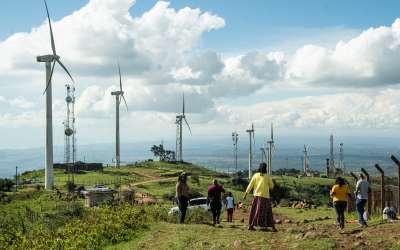Gabon submits climate plan to UN ahead of Paris conference
Gabon has submitted its new climate action plan to the UN in advance of the key meeting in Paris in December, becoming the first African country to do so

Gabon has submitted its new climate action plan to the UN in advance of the key meeting in Paris in December, becoming the first African country to do so.
This Intended Nationally Determined Contribution (INDC) comes well in advance of the deadline that was set in the build up to a new global climate agreement, due to be agreed at the UN climate conference in Paris in December.
Over 35 parties to the United Nations Framework Convention on Climate Change (UNFCCC) have now submitted their formal INDCs including all the countries under the European Union plus the European Commission, Mexico, Norway, Russia, Switzerland and the United States.
The scheduled Paris agreement would come into effect in 2020 with the aim of enabling all countries to combat climate change and prevent average global temperatures rising above 2°C.
UN member states and parties to the UNFCCC have already finalised their negotiating text for the Paris deal and formal negotiations will continue at the next UN climate meeting in Bonn from June 1 to 11.
The text covers the options on the content of the new agreement including mitigation, adaptation, finance, technology, capacity building, and transparency of action and support.
Christiana Figueres, Executive Secretary of the UNFCCC, said: "I deeply appreciate Gabon's initiative and welcome this first INDC from an African nation."
Ms Figueres is encouraging nations to submit their INDCs as soon possible, underlining their commitment and support towards the Paris meeting.
Figueres said: "According to UNFCCC data, two thirds of industrialised countries covering 80 per cent of greenhouse gas emissions from the industrialised part of the world have now set out their ambition for the new agreement which comes into effect in 2020 - importantly many of these contributions also speak to longer term aims representative of progressively increasing ambition over time. Over the coming months, we expect many more nations to come forward to make their submissions public. The pace at which these contributions are coming forward bodes well for Paris and beyond."
A significant worldwide effort is underway to assist developing nations prepare their INDCs for submission, many of which are building on work linked with their Nationally Appropriate Mitigation Actions (NAMAs).
The governments of Australia, Germany, France, the UK and the United States, as well as UN agencies and intergovernmental organisations, are providing financial and technical support to around 100 developing countries including Bangladesh, Colombia, Senegal, Ethiopia and Gambia to Lebanon, Mali, Dominican Republic, Tunisia and Turkmenistan.
France has committed around €3 million to support the preparation of INDCs of approximately 20 Least Developed Countries including Small Island Developing States.
Other major players include the Global Environment Facility and the UN Environment Programme; the European Union through programmes such as Clima South, Clima East or ClimDev; Germany through the GIZ; and the U.S. through initiatives including the Low Emission Development Strategies partnership.


